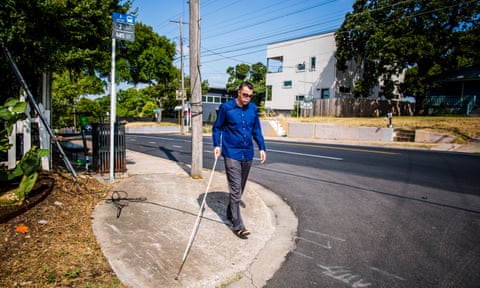Qusay Hussein: injured by a bomb in Iraq, rescued by Médecins Sans Frontières
When I think about my childhood I think of colours. The orangey-brown mud of the family home; the deep, rich greens of the mountains on either side of our valley. Home was Abujna, a small village on the edge of Mosul, Iraq. Life changed when the war started in 2003. We were a little away from the fighting, but I saw planes shooting a car on the street next to our village. Two men and a woman were killed. Then famine hit and the farm could no longer provide for us. We moved to Hatra when I was 15 in order to find the money to survive.
The evening of 3 August 2006 was like any other. My friends and I were playing volleyball and a crowd had gathered to cheer us on. Towards the end of the match, I noticed a small truck coming towards us. I didn’t think much of it; people often drove up to watch us, and there was a place to grind wheat for flour close by. As the truck grew closer it got stuck in the sand. The driver, a man in his 50s or 60s, revved the engine heavily, and suddenly he was coming up close behind me. I jumped out of the way, as it looked as if he might crash into me. I caught his eye, he looked left and then right, and then directly at me with a smile. He pushed his hand down on the horn, and instead of honking, a whirring began.
Everything went dark at that point: just the red of the fire as people and cars flew through the air like birds. I was thrown upwards with the explosion, falling back to earth through the smoke headfirst. All I could see was smoke, and the blood flowing from my nose. All I could think to do was run, but as I stood up I was hit by shrapnel in the head. I lost control of my body and collapsed. There and then I lost my sight.
A few minutes later I heard my father’s voice. He was crying. I told him not to leave me else I would die. At the clinic the doctor told him I would be dead within 30 minutes. Thankfully I didn’t die, and soon my father was driving me to a hospital in downtown Mosul, a journey of 70 or 80 miles. En route we were stopped by American soldiers. I had no idea what was going on when they put a medical shot in my back, nor when I heard the sound of a helicopter approaching. I went into a coma for 12 days.
When I woke up an interpreter asked my name. I told her: Qusay. She thanked God I knew it, which I didn’t understand. I had no recollection of what had happened. As soon as she mentioned the explosion everything came back to me. If the shrapnel had hit my head just one hair’s width differently I’d have lost my entire memory. That, she told me, is why she thanked God.
My family assumed I’d died and were already in mourning. When my father received the call from the Americans 14 days later he didn’t believe I’d survived. He thought someone was trying to lure him towards danger. It was only when they mentioned the tattoo on my arm – my name – that he could let himself accept it.
Neither Iraqi doctors nor the US soldiers had the resources to help me heal, so for the following months I struggled, to breathe, to eat, to live. I had no nose, no cheek, half my skull was missing. Then one day I was half-listening to the TV – an advert was calling for people injured by war to get in touch with Médecins Sans Frontières. I was taken to Amman, Jordan, where I spent three years rehabilitating.
I live in Austin now. I’ve been here almost seven years, and soon I’ll have completed my degree at the University of Texas. I’m a refugee, a product of war, but in many ways I feel lucky. Not only am I still here, but I’ve started a new life doing things I could never have imagined. I’m hopeful about the future. If what I’ve been through has taught me anything, it is that you should take every opportunity that comes.
Kathy Pannozzi: former nun who found the love of her life at her local church
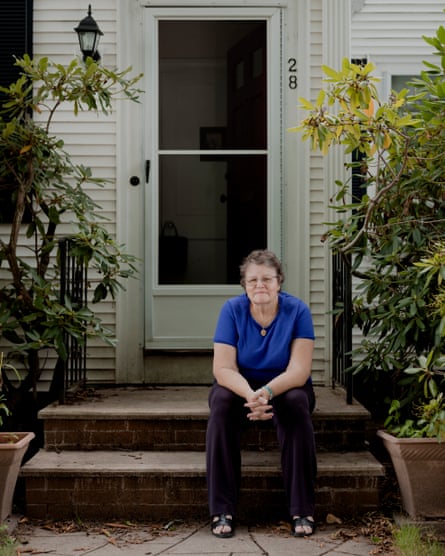
A lot of people were surprised when I entered the convent. I can see why. While I embraced every aspect of being a nun when I joined the Sisters of Mercy, a Catholic convent in Providence, Rhode Island in 1965, aged 18, my life before might not have suggested it. I had boyfriends in high school and I liked to talk. There’s a lot of silence involved in being a nun and, of course, there are the vows: poverty, obedience and celibacy.
To my mind, it was the best way to be of service to the world. My sixth-grade teacher, Sister Maura, was my inspiration. She was fair and smart. We stayed in touch as I grew older and she mentored me as I started my training.
It was all very exciting at the beginning. Silence was expected for much of the day, and there were prayers, classes and chores. This was the 1960s in the United States and the Me generation was leading a revolution. I like to think becoming a nun was in its own way quite counter- cultural. After three years of living in isolation with my fellow trainees, years four and five were spent at an all-women’s college. We would stay up late on campus listening to music and talking. Asking what does it mean to be a religious woman? To be of service? To be celibate? Many of the women I started with decided life as a nun just wasn’t for them – they moved away, got married.
After taking up my teaching post, I delayed taking my vows for a year or so. I wanted to make sure my decision was right. But in the end I decided to stay and commit my life to God. It was 1974, and I decided I wouldn’t marry or have children. I made my vows and that was that.
And then in the fall of 1977, a new priest arrived at my local parish. By then I lived in an apartment with other sisters, and would regularly go to his church, St Mary’s. On 4 October I went to evening Mass as I often did. Frank was leading it; he seemed a nice guy, certainly good- looking. Afterwards I introduced myself and we talked for a while. I became a regular at the service, half to pray and half because of him: he gave a good sermon. He valued my thoughts and opinions. We became good friends.
Things carried on this way for two-and-a-half years, until 26 September 1980. I got home from work to hear Sister Maura was unwell and in hospital. I was inconsolable, not just because of her condition, but bereft that I’d never told her how much she meant to me; how much I valued her; that she was loved. I went to see her that night.
The next day I was with Frank. We were alone together, which was unusual for us, picking apples in an orchard. I told him about Sister Maura and how heartbroken I was. Frank turned to look at me: “Kathy, that’s how I feel about you.” Less than a year later we would be married.
Before then, I questioned my vows and my relationship to God. It took time, but I came to the conclusion I stick by today: being a Sister of Mercy was a gift from God, and so, too, was Frank appearing. I could take or leave either, to God it didn’t matter, because God is in the people all around us. I opted for Frank and I have not one regret. It’s 38 years since our wedding, and he’s a gift that just keeps on giving.
Dwayne Fields: victim of gang crime who became an explorer and naturalist
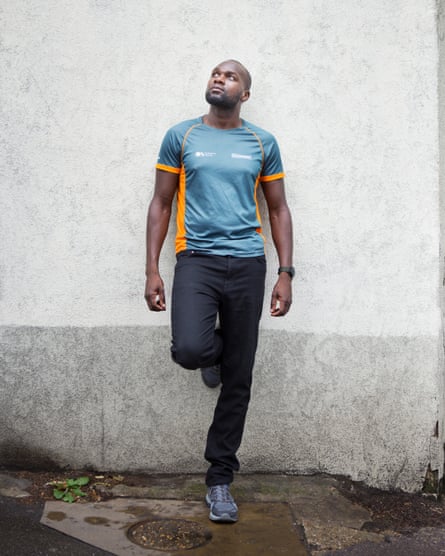
I’ve never carried a knife or a gun. But as I know too well, that doesn’t guarantee freedom from their violence. I’ve got two stab wounds on my body; I’ve been held at gunpoint on at least three occasions. That was just my life growing up on an estate in Stoke Newington, London. It was typical. One time I was walking with a friend through an estate in Tottenham and woke up waiting for an ambulance to collect me with one stab wound in my stomach and another in my chest. After that, people around me were saying we should catch up with my attackers and get them. There was pressure to get revenge. The more I heard those voices, the more I wondered if they were right.
By the age of 21 I’d tried to move on from that incident. I built a moped myself from scratch. I let my brother take it out on a test drive around our area. He was pushed off it on a neighbouring estate and it was stolen. I’ve never been as angry as I was when he returned. I marched over to where I knew I’d find these guys to demand it back. I found a group of eight or nine boys busy taking it apart. I went to grab it – we got into a fight. When I looked up, a gun was pointing right at me. I pushed my brother aside and looked directly into the eyes of the holder of the weapon. “You don’t have to do this,” I said, trying to stay calm.
And then he pulled the trigger. I heard the sound. Oh shit, I thought, I’ve been shot. I couldn’t feel any pain. I assumed I was just numb. He pulled the trigger again. Before the shooter could go in for a third, his friends pulled him away. As I walked the 10-minute journey home I stopped to look again for a bullet hole. Could the gun really have misfired twice? My phone was filling up with texts and calls: we’ve heard what happened, what are you going to do about it?
That night I re-evaluated everything. I thought back to the kid I was in Jamaica before I moved to London when I was seven; the time spent outdoors exploring in nature. I wanted to find that person again. Making decisions to fit in with the crowd just wasn’t working. I ran 10k, and completed the Three Peaks Challenge. I applied to join James Cracknell and Ben Fogle on a trip to the South Pole. I was too late; I was offered the North Pole instead. I wasn’t bothered. I’m from Jamaica, man, to me they were just cold and icy. Since then I’ve circumnavigated Jamaica by kayak, run ultra-marathons and trekked across the Sinai desert.
The adventures and expeditions are great – I can see the world and tell stories – but doing them also helps me show others how to live their best lives, too. I’ve been given a second, third, fourth chance. You need to seize them. As I tell everyone, you never know if you’ll get one again.
Jan Jacobs: realised she was gay at the age of 50 and started a new life
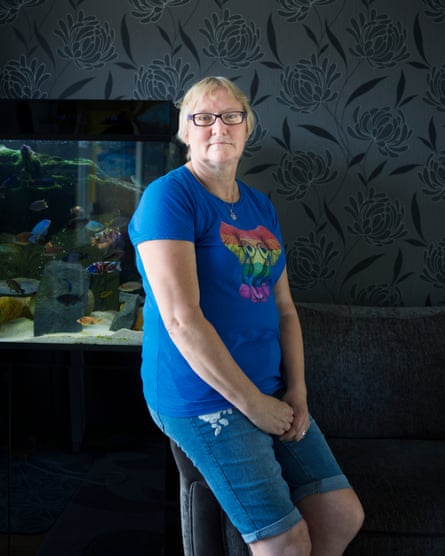
It didn’t feel a big deal when Erin, my daughter, came out as bisexual. There was no moment of revelation. It wasn’t long before she set about exploring her identity, and I wanted to be there with her. We went to Cardiff Pride together in 2011 – that’s the city where she was studying. I felt so comfortable, although I didn’t think much of it at the time.
There was a lot going on that year. I was about to turn 50 and my silver wedding anniversary was fast approaching. Chris, my husband, and I were already making plans, but I was sliding further and further into the abyss. I’d always been unsure in myself, ever since childhood. I’d lacked confidence. But I’d assumed as I grew older I’d feel better in myself. I was married, a mother, I worked as a teacher – a job I adored. So why was I miserable?
I’d been seeing a counsellor on and off for years, and after coming home from a weekend away with my girlfriends I went to see her. I was talking about feeling down, about loving Chris – my husband – but not feeling like I was in love with him. And then I heard these words coming from my mouth, as if another person inside me was speaking: “I think I’m gay.”
Where those words came from I still don’t know. The minute I said them, though, it just felt right. I felt so much lighter, so much happier. I started to tell my closest friends and each time I did a weight was lifted. Something was changing, I was emerging.
And then one morning Chris stopped me in the kitchen before work. I’d been waiting for the right moment, but he could tell something was going on. I couldn’t lie to him. I went off to stay with my parents for a few days. He found it difficult, I’m pretty sure he still does. We shared a house for months after that, although I’d spend a few nights a week at a friend’s for space.
I felt amazing, but also very alone. None of my friends were gay – I needed to find a community. There was a local lesbian support group so I went along. The first time I went, I stood outside the door, terrified. I don’t like social situations at the best of times, but quickly found my place.
A friend told me about a woman called Sarah who she’d known forever. Sarah came out when she was 12, so we were introduced – she could show me the ropes. We’d go for coffee as friends. I’m just finding who I am, I’d tell myself. I’m not looking for a relationship. We were still officially “friends” the first time we kissed. We were hugging goodbye on the porch at her parents’ place. It just sort of happened. It felt amazing, as if I was floating. We finally admitted to each other that we were dating a few months later. Then, after a week of “staying over”, she just never went home.
My second wedding day was very different to the first. When my car pulled up to the venue, Sarah was there in her wheelchair. We just looked at each other and in that moment we knew this was how it was supposed to be. We kissed and she asked if I was sure about the marriage. “I’ve never been more sure of anything in my life,” I replied.
The feeling of being loved and being in love is still so special to me. I feel like the luckiest woman in the world.
Michelle Dorrell: was in the audience at Question Time and then decided to enter politics
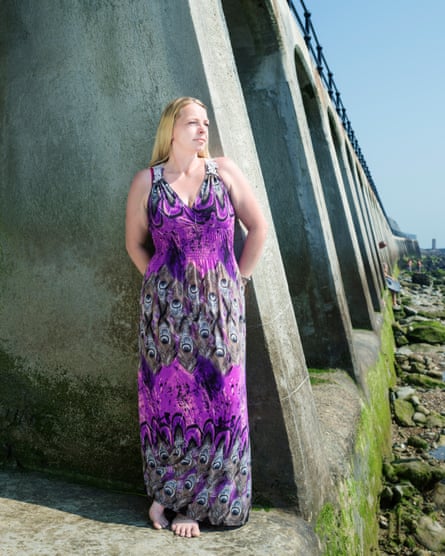
We only applied to be in the audience as a joke, really. My partner – now husband – and I were watching Question Time on TV. At the end, the future dates and locations popped up on the screen. They were coming to Dover, just down the road from us. It was supposed to be a laugh. The thing is, I knew people like me don’t get heard: we’re not listened to, and we’re made to feel like we don’t know enough.
The previous few years hadn’t been easy. I’d left school at 16 and worked in call centres until I hit 30, and by then I had four kids and a divorce. Things started to crumble when I was pregnant with number four. My employer made it impossible for me to stay in my job. At 31, I walked into a job centre for the very first time. I had no savings left; I had spent everything to try to stay afloat. I couldn’t make the rent payment, I had no security. I lost all sense of self-worth. Having to tell my kids that I couldn’t afford to buy them Christmas presents will forever be painfully etched into my memory.
I had never voted before the 2015 general election rolled around, but on the day I thought, “Sod it!” I voted Conservative. I believed David Cameron when he said “We’re all in it together.” I believed him when, on national television, he promised not to cut the tax credits that I relied on to survive. And then he did it anyway. I was scared and I felt so let down.
Still, I had no intention of speaking when I took my seat in the studio audience. I didn’t want to embarrass myself. As the recording went on, however, the more wound up I was getting. Something just happened when Amber Rudd started speaking about bringing the country economic security. A ball of anxiety and frustration and anger came flying out of my mouth. I said I voted for her, that I believed their promises and they betrayed me.
I nearly broke down. It was the first time my voice had been heard. It all just came out, live on BBC TV.
The next few days were a blur: every newspaper, TV station and radio show was ringing, reporters showed up at my door. I didn’t know whether to run and hide or to embrace it, but deep inside I knew I deserved to be listened to, just like all other working-class women; people who are struggling; single mums. When things died down I started reading, I met with politicians from different parties. I got involved in my local Labour party. I stayed on the fringes at first while I learned to believe in myself.
That’s how I ended up in a room above my local count after this year’s local elections, shaking and pacing as the ballots were totted up. I had agreed to run as a candidate to be a councillor; if I was going to bemoan the lack of working-class politicians I decided I should practise what I preach. When I realised that I’d been elected I burst into tears – although I made sure the Tories didn’t see me crying.
It feels so wonderful to finally feel that things I say are worth hearing. For a long time I felt worthless. Now I’m making sure I, and my local community, have a voice. I wouldn’t have believed a word of it if you’d told me all this when we applied to be in the Question Time audience. It’s bizarre how something so little ended up changing so much.
Colin Thackery: Chelsea Pensioner who won Britain’s Got Talent at the age of 89
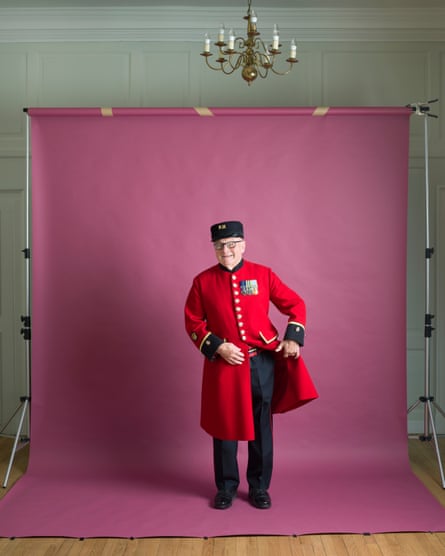
There was always a joke in the family that one day I’d end up at the Royal Hospital Chelsea. We would get leaflets sent to the house once in a while, selling it: “Retire in style,” they said. One evening I threw one on the table at dinner and told Joan, my wife, and the kids that if their mum went first, that’s where I’d go. It never crossed my mind it would actually happen. When she died in 2016 it felt like my life was going into reverse. After 66 years of marriage, I wasn’t sure what would happen. We had met at a barn dance at my army camp in County Durham while we were still kids, and we’d lived all over together, before settling back with our two children in Britain. It wasn’t the first time the future looked uncertain. When I retired from the army at 40, having joined at just 15, I’d felt much the same. But with Joan by my side, I knew we would find a way through. This time I was less certain.
Music had always been my passion. I’d joined the Royal Artillery Band as a drummer as a teenager. I’d sung in the choirs on troop ships to get out of other duties. When we moved to Norfolk, Joan and I had been part of our local operatic society. We did that together for 25 years. And so, while I worked out the move to Chelsea, I carried on singing. If I hadn’t I think I’d have gone barmy.
Moving to the Royal Hospital Chelsea seemed to be the start of the end for me. I felt like I was living in an old folks’ home and I was morose. But after a while a new friend and I started to entertain everyone in our social club once a month after Curry Fridays. Bill would do country and western numbers, I’d take the ballads. I noticed that singing raised my spirits once again.
Stepping off the stage one evening, a bloke came up to me. He’d seen that Britain’s Got Talent had opened auditions, and suggested I apply. I told him not to be silly, why would they want an old man like me?
“If you don’t use it, you lose it,” he retorted. And then he dared me to, so I printed the form and sent it off.
There were a few rounds of auditions before I found myself at the filmed audition in front of a packed house at the London Palladium. A harem of female family members whooped as I came on. I’m sure the scarlet coat helped people get behind me. We went for a Chinese after.
By the time it got to the final – and I was announced as the winner – I simply couldn’t believe what was happening. If you watch the broadcast back you’ll see me asking Dec [Declan Donnelly] what was going on. It was very noisy, you see, and I’m slightly deaf. It was extraordinary, I was in a daze.
My whole life has been turned upside down, again, although I’m not complaining. The Royal Variety Show is coming up this month – my aim is to sing in front of the Queen. And there’s an album coming, too, apparently. I’m the oldest person in the world ever to sign a record deal.
If I was a teenager I’m sure I’d be hungry for a huge career, but I’m just enjoying it. It’s never too late, I’ve learned, to do what you love. Just a few years ago I thought everything was over, and now I’m a pop sensation!
